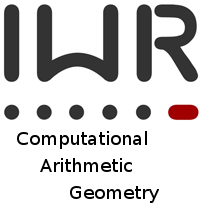Modularity and Galois Representations (Winter Semester 2024/25)
Organisers: Prof. Dr. G. Böckle, A. Shavali
Lectures: Wednesdays and Fridays form 11:00 - 13:00 in SR3, Mathematikon, INF 205 (Starting from 16.10.24)
Exercise Sessions: Mondays form 14:00 - 16:00 in SR3 (Starting from 28.10.24)
Exams: TBA
The language of the lectures will be English and the solutions to exercise sheets must be written in English.
About the Course:
Many questions in number theory can be formulated in terms of representations of the absolute Galois group of the rational numbers Q or of a general number field, typically with coefficients in a p-adic field. One source of such representations is the p-adic etale cohomology of varieties over a number field. The perhaps best known example that fits this description is the Tate module attached to an elliptic curve, or an abelian variety. Another rich source are modular (or more generally algebraic automorphic) forms. Starting with Eichler and Shimura there was a growing expectation that many such representations that arise from geometry also arise from automorphic forms; then the representation would be called modular. A first truly spectacular consequence of this philosophy was Wiles proof of Fermat’s Last Theorem (FLT), completed together with Taylor in 1995. They proved that any semistable elliptic curve `was’ modular. Still before Wiles, in the 1980s Serre formulated conjectures on absolutely irreducible 2-dimensional odd Galois representations of the absolute Galois group of Q with coefficients in finite fields, namely that they should all arise from modular forms. This would also give a proof of FLT, and these conjectures of Serre are now a theorem of Khare and Wintenberger from around 2007.
The course will give an introduction to the theme of modularity of Galois representations. We shall review some background (with few proofs). Then we will properly state several conjectures/theorem on modularity. In the later part of the course we shall learn some of the techniques to prove modularity results. It is certainly not expected that the participants know all the background. But perhaps the course is a motivation to take further courses in this direction, or explore research questions on once own.
Organizational Details:
- If you are interested in participating in this course, please register for the course in Müsli. Master and PhD students from Universities of Darmstadt, Frankfurt and Mainz can also register in the course via Müsli but should send an email to the assistant of the course.
- This lecture course will have weekly homework assignments. A new sheet of homework assignments will be provided on MaMpf every Friday around 13:00. Please hand in your solutions to these by 11:00 a.m. on the Friday of the following week by uploading a pdf on MaMpf. The homework assignments are encouraged to be submitted in teams of two, which could be formed in the first tutorial session of the semester.
- Exercise sheets, lecture notes and possibly videos of the lectures will be made available to the students via MaMpf and grading exercises, registration in tutorials, exams and ... will be handled via Müsli and heiCo. Access to MaMpf will only be given to the students registered in Müsli.
- In order to be admitted to the final exam, successful participation in the accompanying exercise sessions (tutorials) is required; Anyone who regularly takes part in the tutorials and obtains at least 50% of the achievable points on the homework problems, will be admitted to the exam.
- It is planned that the final be oral, and that it will be offered during two time periods, one being at the end of the teaching period of the semester. Students will have to register for the exam. The grade for the module will be based entirely on the performance in the final exam.
Literature: TBA
